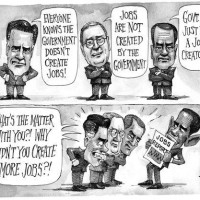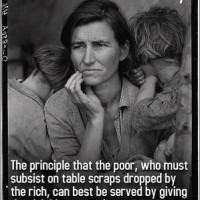economics
The Best Government Money Can Buy
“
Republicans are now proposing to cut about $3 trillion over ten years from programs that help the poor, the unemployed, the sick, and the elderly. But that $3 trillion in cuts won’t reduce the deficit one penny because they are also giving $3 trillion in new tax cuts that go only to the very wealthy.
So they’re proposing to take benefits away from the most truly needy people in our society in order to give trillions of dollars to the wealthiest Americans. In every possible sense, many in Congress are actively trying to steal from the poor, the middle class, and even the moderately well-to-do and giving to the very rich and powerful.
And it will remain this way until we enact some kind of meaningful campaign finance reform.
Far from being a “nanny state” as Republicans claim, too many people in our government work for the highest bidder. More than ever, they protect the wealthy and the powerful instead of looking out for the people who need help the most.
“
Republican cognitive dissonance on government & jobs
Aside from which he DID save the economy which THEIR policies had destroyed and which was hemorrhaging 750,000 jobs a month when he took office.
Aside from which these Repugs do everything in their power to BLOCK anything Obama & the Democrats try to do to create jobs.
Aside from which they ran (and got elected) on promising that THEY would create jobs.
Aside from which they are shameless fuckers.
“Romney’s Bain Yielded Private Gains, Socialized Losses.” (That about sums it up.)
“Mitt Romney touts his business acumen and job-creation record as a key qualification for being the next U.S. president.
What’s clear from a review of the public record during his management of the private-equity firm Bain Capital from 1985 to 1999 is that Romney was fabulously successful in generating high returns for its investors. He did so, in large part, through heavy use of tax-deductible debt, usually to finance outsized dividends for the firm’s partners and investors. When some of the investments went bad, workers and creditors felt most of the pain. Romney privatized the gains and socialized the losses.
What’s less clear is how his skills are relevant to the job of overseeing the U.S. economy, strengthening competitiveness and looking out for the welfare of the general public, especially the middle class.
……..
Success, entrepreneurship, risk taking and wealth creation deserve to be celebrated when they are the result of fair play and hard work. President Barack Obama is correct in distinguishing the patient creation of value for the benefit of investors through genuine operational improvements and growth — the true mission of private equity — from the form of rigged capitalism that was practiced by some in the industry in the past when debt was cheap and plentiful.
While Bain Capital wasn’t alone in using financial engineering to turbo-charge its returns, it was among the most aggressive under Romney’s leadership. Enriching investors by taking leveraged bets isn’t a qualification for a job requiring long-term vision and concern for public welfare. It is appropriate to point that out to voters.
“
Mitt Romney, American Parasite:
http://www.villagevoice.com/2012-04-18/news/Mitt-Romney-american-parasite/
Example #9,317 why I am not and never will be a @RonPaul supporter.
Excuse me sir but that word “Liberty,” I don’t think it means … what you think it means.
Ron Paul’s Anti-Net Neutrality ‘Internet Freedom’ Campaign Distorts Liberty<
Some good comments:
If net neutrality is lost the internet will turn into a handful of walled gardens, controlled by Telcos similar to cable TV. Its already hard enough for startups and businesses to thrive and a variety of voices to be heard, without phone companies having the power to decide what content is given more bandwidth and what is not. Since Rand Paul endorsed Romney’s candidacy, the Paul’s seem to have taken a shift towards the corporatist agenda. They can’t genuinely believe that the large corporations of America represent the free market principles they claim to believe in.
The reality is that via their lobbying the large corporations of America do everything they can to avoid free markets and to gain as much power over the markets they operate in, as possible. So to say now that massive corporations represent the principles of the founding fathers, which are best expressed by allowing telcos to control access to bandwidth is an either utterly ridiculous or extremely naive on their part.
To come out as say what they have, plays right into the hands of those who want to destroy the power of the internet. Net neutrality is the one thing that is causing governments to have to watch what they say and do these days. What chance will all the activists who use the net to fight for rights and freedom have of being seen or heard if Net neutrality is lost. The Pauls claim to be for freedom and liberty, but their policy on Net neutrality would destroy the very means of maintaining economic and political freedom that the internet has become.
Any principle taken to far can lead to absurdity. Including the principles of free market economics. Checks and balances are always needed and it is the role of government to establish them. Net neutrality enables the balancing of interests and internet resources, that makes the genuine application of free market principles (as opposed to corporatism) possible in the age of the internet. Remove Net neutrality and you kill both free marketing capitalism and the possibility for open and informed democracy. Net neutrality should not just be a law. It should be added as an amendment to the U.S constitution as it is such a fundamental enabling factor, in the pursuit of life liberty and happiness in this information-communication age.
The Pauls claim that Net neutrality law means too much government is control of the Net. But the truth it is the existence of Net neutrality that gives people more power to control government and corporations. Large corporations fear that this growing internet mediated people power, will soon restrict their freedom to exploit the masses and monopolize markets. Which is why so many corporations want to remove net neutrality. It seems the Pauls are now playing a facilitating role in delivering the internet into the hands of corporations, under the cover of the libertarian principles they espouse. If end of net neutrality would be the beginning of the end of liberty.
–thenetician
I completely agree with Paul Henry – unregulated freedom as the Pauls want society to be has a huge bias towards those who already have the gold and gives way too much power to corporations who are not elected and have no checks and balances from the people (other than to shop elsewhere in some markets – but not all – I only have the option of 1 ISP since they are the only company that services my area, for example, because the other companies are true to their pocketbook – their primary goal is to make money for the lucky few who are upper management or investors and it is not cost effective to service us, so my choice is one company or no internet). But, even when we had a choice, free markets without regulation create abuse of employees, abuse of civil liberties, and the horrid “trickle down” scenario that leaves the scraps for the bottom. What the Pauls propose is not free capitalism as it is in pure definition or as it would have been 200 years ago, but in a society with such a huge division of wealth such as ours, and with a system where the wealthy make the rules, such as ours – it is dangerous hyper-capitalism that will only lead to more poor and suffering overall and even heavier fat cats. IMO of course.
— Mindi Upchurch · University of Colorado at Colorado Springs
For all their talk about “freedom,” libertarians have always treated it less as a fundamental right than as a plaything to be used primarily by the wealthy and powerful. The rest of us, well, it’s not that they don’t want us to have any at all, exactly–they just want us to wait our turn, until after the big boys have eaten, and maybe if we’re lucky there will be some scraps left over on the table for us.
To the Paul dynasty, it’s entirely natural that “freedom” would be something that is to be enjoyed by AT&T, Comcast, and Verizon first and foremost. Meanwhile, the rest of us can enjoy the glorious “freedom” of visiting those websites that happen to have signed exclusive deals with whichever monopolistic bandwidth provider happens to serve our area. That ought to be enough “freedom” for anyone, right?
— Paul Henry
Oligopolies are more dangerous than goverments. If oligopolies are unchecked they can end up as today; owning and operating the governments AND the media AND energy distribution AND telecommunications AND Health Care AND the Judiciary AND the Universities AND the schools AND the land, AND the Military
–Robert J. Berger, Chief Technology Officer at Runa Inc
The “trickle-down” theory explained.
Criticize #Obama all you want, but every thing he says in this speech is right on
Remarks by the President at the Associated Press Luncheon | The White House
http://www.whitehouse.gov/the-press-office/2012/04/03/remarks-president-assoc…
Lots of great quotes from this speech but a few that stood out…
”
This congressional Republican budget is something different altogether. It is a Trojan Horse. Disguised as deficit reduction plans, it is really an attempt to impose a radical vision on our country. It is thinly veiled social Darwinism. It is antithetical to our entire history as a land of opportunity and upward mobility for everybody who’s willing to work for it; a place where prosperity doesn’t trickle down from the top, but grows outward from the heart of the middle class. And by gutting the very things we need to grow an economy that’s built to last — education and training, research and development, our infrastructure — it is a prescription for decline.
. . . . . . . .
I guess another way of thinking about this is — and this bears on your reporting. I think that there is oftentimes the impulse to suggest that if the two parties are disagreeing, then they’re equally at fault and the truth lies somewhere in the middle, and an equivalence is presented — which reinforces I think people’s cynicism about Washington generally. This is not one of those situations where there’s an equivalence. I’ve got some of the most liberal Democrats in Congress who were prepared to make significant changes to entitlements that go against their political interests, and who said they were willing to do it. And we couldn’t get a Republican to stand up and say, we’ll raise some revenue, or even to suggest that we won’t give more tax cuts to people who don’t need them.
. . . . . . . .
So as all of you are doing your reporting, I think it’s important to remember that the positions I’m taking now on the budget and a host of other issues, if we had been having this discussion 20 years ago, or even 15 years ago, would have been considered squarely centrist positions. What’s changed is the center of the Republican Party. And that’s certainly true with the budget.
. . . . . . . .
So the American people’s impulses are absolutely right. These are solvable problems if people of good faith came together and were willing to compromise. The challenge we have right now is that we have on one side, a party that will brook no compromise. And this is not just my assertion. We had presidential candidates who stood on a stage and were asked, “Would you accept a budget package, a deficit reduction plan, that involved $10 of cuts for every dollar in revenue increases?” Ten-to-one ratio of spending cuts to revenue. Not one of them raised their hand.
Think about that. Ronald Reagan, who, as I recall, is not accused of being a tax-and-spend socialist, understood repeatedly that when the deficit started to get out of control, that for him to make a deal he would have to propose both spending cuts and tax increases. Did it multiple times. He could not get through a Republican primary today.
. . . . . . . .
“



